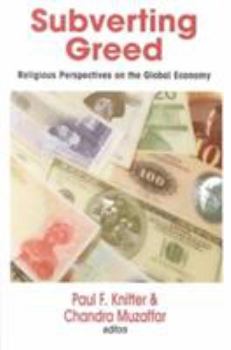Subverting Greed: Religious Perspectives on the Global Economy
(Part of the Faith Meets Faith Series)
Select Format
Select Condition 
Book Overview
The Boston Research Center for the 21st Century is pleased to announce the publication of Subverting Greed: Religious Perspectives on the Global Economy (Orbis Books, November 2002, in association... This description may be from another edition of this product.
Format:Paperback
Language:English
ISBN:1570754462
ISBN13:9781570754463
Release Date:November 2002
Publisher:Orbis Books
Length:193 Pages
Weight:0.55 lbs.
Dimensions:0.5" x 5.5" x 8.5"
Customer Reviews
2 ratings
the more the merrier
Published by Thriftbooks.com User , 14 years ago
We have a wise saying stating that there is nothing better that sharing the good moments of life. This book tells us exactly the same from an economic perspective.
One approach to justice for all.
Published by Thriftbooks.com User , 21 years ago
The writers of this collection of essays may represent different religions, but they represent one thought: globalization is bad. Their idea is not so much to subvert greed but to subvert capitalism, which they would see as being the same thing. This is less about personal responsibility than corporate greed. On the surface, while the essayists may be coming from various points of view, in fact, they have one. Far from promoting diversity and having a dialogue, this book does the opposite. It tells but one story, and one side of that story. It says that capitalism causes poverty, and that something else must take its place. All right. So, what is it? And how will it work? In the last 200 years, many religious groups have tried to start their own economic societies, usually based on some kind of communalism. And most of these have disappeared. The grand experiment of the Soviet Union and other forms of forced communalism also collapsed from their own weaknesses and failings.What these writers offer is the usual Ivory Tower approach, somehow trying to persuade or even force the rest of us into their way of thinking and living. All without a lot of details of how this would work out for Joe and Jane Lunchbucket in Peoria.As I noted, this is less about individual greed and more about the effect, real and perceived of large international companies. I offer three reasons that the writers shy away from individual accountability. First, if ordinary people really read this kind of stuff, they might begin to feel threatened, and they might get politically involved and start to speak up for themselves. The Ivory Towerists loathe that. They want a world run by "experts" like themselves. Second, someone might ask about individual and local responsibility in poor countries. As in, what are they doing about it, besides waiting for the next handout, or the next bit of graft? Then, finally, they're great with the ideas, but poor in the execution. Either they haven't thought that far, cannot see that far, or don't want to let us, the unwashed, in on their Grand Plans. This is a must read for those who look around and see world poverty and ask what we could do about it. This book is important because it represents a very powerful idea that is widely popular among academics and "anti-poverty" activists. We need to know what everyone is thinking in this area, and not just read stuff that we agree with.






